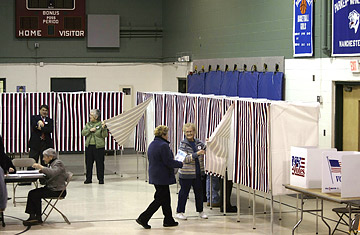
Ballot Inspector Rita Paris helps voters as they enter the voting booth at the Parker Varney School polling location on Election Day, January 8, 2008, in Manchester, New Hampshire.
As the Super Tuesday mother lode of primaries and caucuses fast approaches, both the Democratic and Republican races for the presidential nomination are equally tight, with no clear front-runner emerging for either party. Most hypothetical matches for the general election are looking similarly close. But so far in at least one key respect, the Democrats are clearly beating their G.O.P. counterparts: voter turnout.
Voters are showing up at Democratic primaries and caucuses in record numbers, doubling, tripling or even quadrupling the turnout totals recorded in the last fully contested two-party election in 2000. Overall, Democrats have so far outnumbered Republicans at primary polling places by a rate of about 7 to 5.
So far four states have held primaries or caucuses that both parties actively contested, and in each, Democratic turnout is outrunning participation by Republicans:
— In Iowa, some 239,000 Democrats turned out at the caucuses, almost twice the all-time record. Republicans doubled their turnout in Iowa, as well, but still only reached 114,000.
— In New Hampshire, some 287,000 Democrats turned out to vote, up from 156,862 in 2000, while Republican turnout decreased slightly to 238,000.
— In Nevada, more than 116,000 voters attended Democratic party caucuses in a state where, eight years ago, the gatherings attracted only about 1,000 votes. Republicans, too, broke turnout records. But their total of 44,315 votes was about a third the size of the Democrats'.
— In South Carolina, a predominantly Republican state, a record of 532,227 voters showed up to help give Barack Obama a resounding win in the Democratic primary Saturday. By contrast, G.O.P. turnout in the South Carolina primary the week before fell from 573,101 in 2000 to about 431,000 - a drop of nearly 25%.
In total, in the four states where there have been two-party contests — Iowa, New Hampshire, Nevada and South Carolina — 1,174,227 Democrats have turned out to vote compared to 827,315 Republicans, a ratio of 7 to 5. As of now, the level of primary participation is nearing the levels seen in general elections.
These margins matter because Iowa, New Hampshire and Nevada are all closely contested swing states in presidential elections. A switch of less than 10,000 votes in any of the three in 2004 would have handed each state's electoral college votes to a different party.
Meanwhile, where only Republican contests have been held, such as in Michigan (where Democratic candidates refused to campaign) GOP turnout is running behind levels recorded in 2000.
At least four factors are driving turnout: wide-open races for both party's nominations, the historic candidacies of both a black man and a woman, a general concern about the direction of the country and rising economic anxiety. Michael McDonald, a political scientist at George Mason University who studies voter participation, pointed in particular to Barack Obama, whose age and cross-party appeal has helped attract unusual numbers of independents and young people to Democratic contests. As of now, he says, independents are breaking for Democrats by a ratio of two to one. "One of the reasons why independents and young people are voting in a Democratic nomination process where they normally would not be involved is that there is an attractive candidate for them," said McDonald. He added that Obama's impact on turnout could be a cautionary tale for Democrats and Clinton. "I'm not sure if Clinton can replicate the same sort of magic that Obama has in mobilizing young voters and Independents to participate," said McDonald. A spokesperson for the Clinton campaign, Isaac Baker, believes Clinton will be able to pull from those groups in the general election. "Hillary has the ability to inspire new voters to go to the polls and help her make history in November," said Baker.
As for why Republican turnout is lagging Democratic so far, most observers point to a general sense of fatigue in the conservative movement after seven years under President Bush. Not only has the war and a growth in government sapped the party of its enthusiasm, but the grass roots has reservations about each of the leading Republican candidates, from McCain and Romney to Giuliani and even Huckabee.
Still, Republicans are playing down the impact of the turnout numbers on their own party's fortunes in the fall. Mike Duncan, chairman of the Republican National Committee, said, "There is not a direct correlation between turnout in primaries and who is elected President." But he acknowledges, "In the last 35 years, turnout in the presidential primary favors the party out of power."
So far, at least, 2008 is no exception to that rule.
